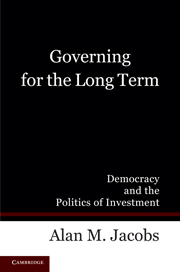Book contents
- Frontmatter
- Contents
- List of Figures and Tables
- Acknowledgments
- PART I PROBLEM AND THEORY
- PART II PROGRAMMATIC ORIGINS: INTERTEMPORAL CHOICE IN PENSION DESIGN
- PART III PROGRAMMATIC CHANGE: INTERTEMPORAL CHOICE IN PENSION REFORM
- PART IV CONCLUSION
- 11 Understanding the Politics of the Long Term
- Bibliography
- Index
11 - Understanding the Politics of the Long Term
Published online by Cambridge University Press: 05 June 2012
- Frontmatter
- Contents
- List of Figures and Tables
- Acknowledgments
- PART I PROBLEM AND THEORY
- PART II PROGRAMMATIC ORIGINS: INTERTEMPORAL CHOICE IN PENSION DESIGN
- PART III PROGRAMMATIC CHANGE: INTERTEMPORAL CHOICE IN PENSION REFORM
- PART IV CONCLUSION
- 11 Understanding the Politics of the Long Term
- Bibliography
- Index
Summary
The politics of public policy is at once a struggle over who gets what and a struggle over when. In designing state action, governments face choices not just about the cross-sectional incidence of gains and losses, but also about how the benefits and burdens of policy should be allocated over time. In arenas ranging from environmental protection to economic reform to the management of scarce natural resources, the impact of public policy on citizens and societies may depend as much on the intertemporal character of governments' decisions as on their distributive profile. Moreover, as the preceding chapters have sought to demonstrate, explaining policy trade-offs over time requires a theoretical apparatus attuned to the distinctive cognitive and strategic features of intertemporal decision making.
The present chapter seeks first to summarize the evidence from the case studies in light of the book's theoretical framework. Then, expanding outward from specific causal hypotheses, I consider a set of general implications of the analysis for the study of public policymaking more broadly. In particular, the book's findings shed light on the relationship between distributive and intertemporal policy choice, on the nature of politicians' goals, on politicians' opportunities for electoral blame-avoidance, and on the role of ideas in policymaking. Finally, we will return to the exceptional Canadian episode of program design and consider the distinctive political logic of investment for the short term.
- Type
- Chapter
- Information
- Governing for the Long TermDemocracy and the Politics of Investment, pp. 241 - 268Publisher: Cambridge University PressPrint publication year: 2011



